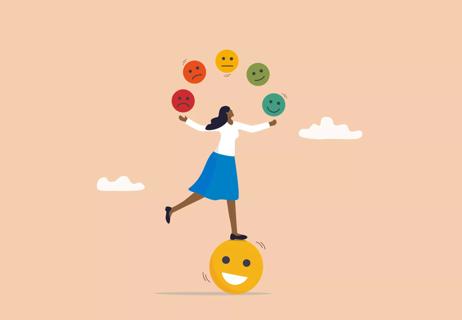The more developed your EQ, the more in touch you are with your feelings, as well as with others’

Each of us approaches the world through our own unique lens, bringing a different combination of background, experiences, personality and emotions. So, it can often be difficult — if not seemingly impossible — to understand how anyone else could see things differently.
Advertisement
Cleveland Clinic is a non-profit academic medical center. Advertising on our site helps support our mission. We do not endorse non-Cleveland Clinic products or services. Policy
That’s where emotional intelligence comes into play. Also known as emotional quotient (EQ), this ability allows us to better manage our emotions while also helping us better understand and connect with others. And it’s a skill you can learn.
Health psychologist Grace Tworek, PsyD, shares just how emotional intelligence works and why it matters.

“Emotional intelligence is the ability to perceive, understand, comprehend and manage emotions,” Dr. Tworek explains. “EQ refers to how you recognize and respond to the emotions of others, as well as how you manage your own emotions and understand how they may be perceived by others.”
Emotional intelligence helps you see beyond your own view to comprehend how other people might be feeling, based on wherever they’re coming from. The higher your EQ, the more you’re able to identify, manage and even anticipate how you or someone else is feeling.
Emotional intelligence can play out in a lot of different ways and generally involves these three steps:
Having more emotional intelligence doesn’t necessarily mean you’re a highly sensitive person, but you may feel things more strongly. When you have a heightened awareness of your emotions, you may experience a wider range of emotions, and you’re more likely to have more empathy. You’re also better able to manage your emotions.
Advertisement
But having high EQ may not always feel like a positive. Some people with high EQ are more vulnerable to “emotional contagion,” which is when you subconsciously mimic or take on the emotions of those around you.
When it comes to emotional intelligence, there are five key components:
Emotional intelligence can help you stay calm and collected under pressure, manage awkward moments with grace and relate to just about anyone you meet. It’s about managing your emotions instead of letting them manage you.
The more emotional intelligence you have, the better you are at understanding your feelings and the feelings of people around you.
In the workplace, higher emotional intelligence may look like:
In comparison, lower emotional intelligence may look like:
Emotional intelligence can also influence how you act and respond in other environments:
Advertisement
“Emotional intelligence involves a lot of reflection and management of our own emotions because we really only have our own experience of emotions to play off of,” Dr. Tworek notes. “The more we’re able to gain understanding and ask questions to be able to relate to others, the better we’re able to put ourselves in someone else’s shoes.”
This can help you relate to people better, be more empathetic and remain grounded even amid difficult times. When we begin to recognize ourselves in other people, we come closer to comprehending how and why we grow into the people we are today.
High EQ comes with many benefits:
It’s important to know that emotional intelligence is something that you can work on. Developing emotional intelligence takes time and dedication. But if this is something you think you would like to improve or if there are areas of your life that could benefit from more emotional intelligence, talk with a behavioral health specialist. They can offer guidance.
Advertisement
Advertisement
Learn more about our editorial process.
Advertisement

Strengthening your EQ involves reflection, accountability and practice

The end of a romantic relationship can bring a sense of disbelief and intense emotions like anger and depression

Allow yourself to grieve, prioritize self-care and lean on your support system — you’ve got this!

Feeling unable to manage your emotions can go hand in hand with other symptoms of ADHD

If you’re torn between contradictory beliefs, questioning your decisions or feeling ashamed about your choices, you may be experiencing cognitive dissonance

Start by naming your emotions, centering your physical symptoms and identifying how your past impacts your present

Horoscopes, fortunetellers and personality tests all feed into our cognitive biases and reinforce our own feelings as true

Enjoyment, sadness, disgust, fear and anger are just the beginning of your emotions

If you’re feeling short of breath, sleep can be tough — propping yourself up or sleeping on your side may help

If you fear the unknown or find yourself needing reassurance often, you may identify with this attachment style

If you’re looking to boost your gut health, it’s better to get fiber from whole foods